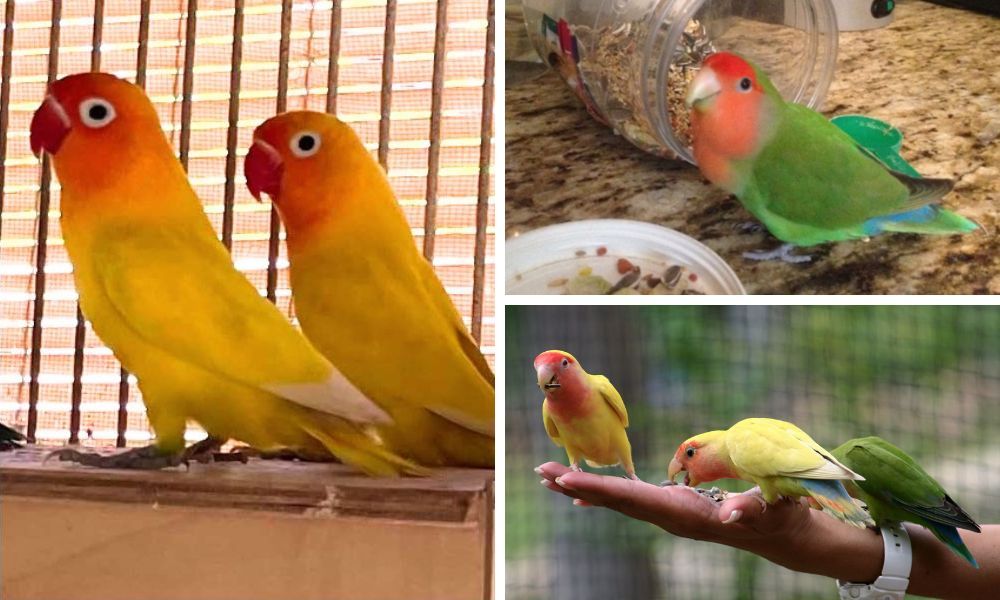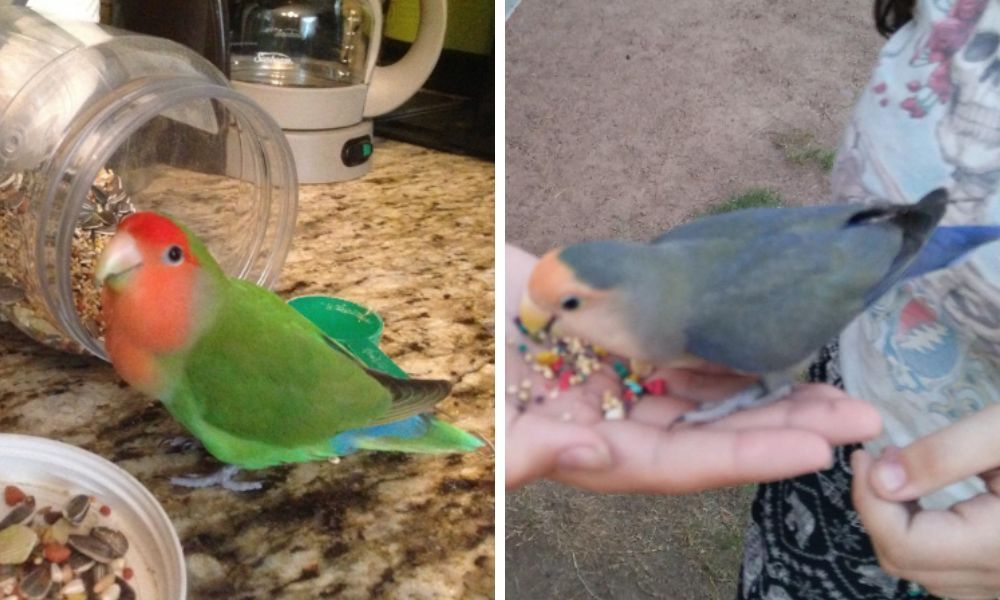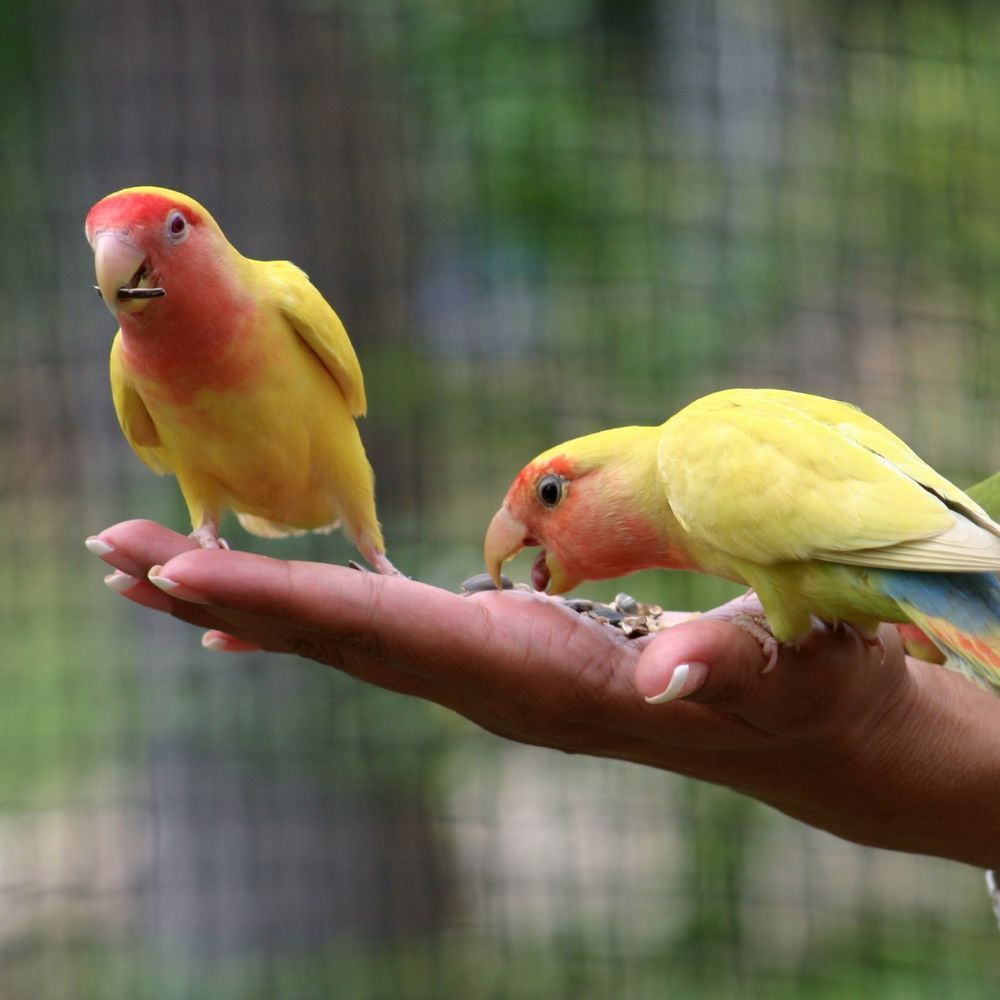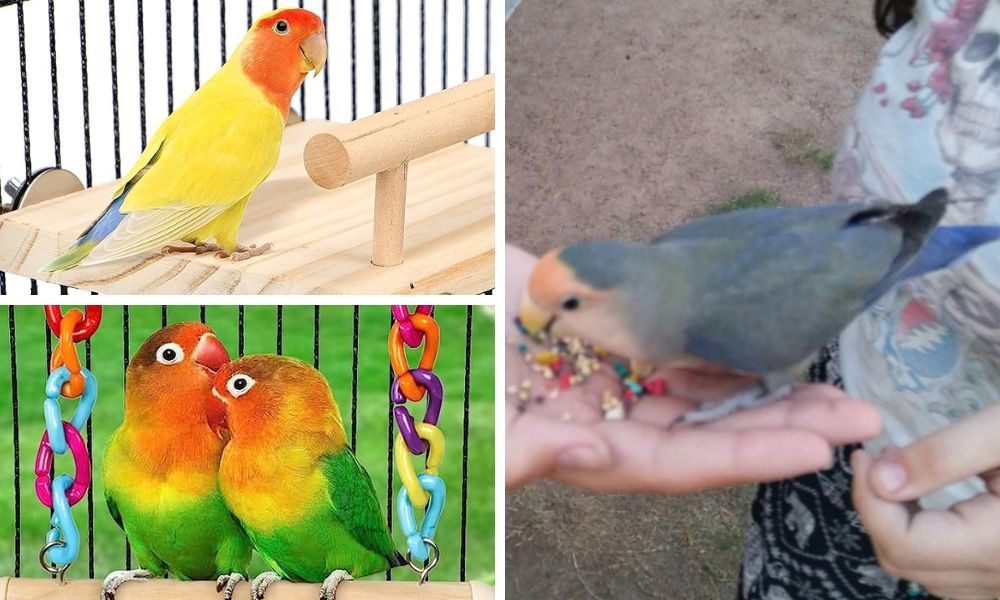Essential Nutrients in Love Birds Food: What You Need to Know
Wondering what are the essential nutrients that must be included in love birds diet? Then, this is just the right place to get all your answers!

Lovebirds are beautiful and affectionate birds, and they require a well-balanced and nutritious diet to meet their bird's nutritional needs and thrive. Feeding your lovebirds with the right nutrients and essential vitamins is essential for their health, happiness, and longevity. As pet owners, we must ensure that our feathered friends get the best food, just like we do. This blog post discusses love birds food and the essential nutrients that your lovebirds need and how to provide your birds with a healthy and balanced diet.
Protein:
Lovebirds require a diet rich in protein as they are active birds with a high metabolic rate. Proteins are essential for their growth, development, and maintenance. Offer your lovebirds high-quality sources of protein, including chicken, turkey, eggs, and quinoa. Avoid feeding your lovebirds seeds as their primary protein source, as seeds are low in protein and high in fat. Converting seed eating birds to a pelleted diet can be challenging, especially for mature birds, so it is important to gradually reduce seed intake while introducing pellets and to monitor their adaptation to avoid potential health issues.
Calcium:
Calcium is crucial for maintaining your lovebirds' health and preventing diseases. A calcium deficiency can result in egg-binding, soft-shelled eggs, or brittle bones. You can provide your lovebirds with calcium supplements or give them foods rich in calcium, such as broccoli, spinach, kale, and eggshells. Cuttlebone is also an excellent source of calcium and a great way to keep your lovebirds' beaks trimmed.
Vitamins:
Vitamins help to boost your lovebirds' immune system, prevent diseases, and promote healthy skin and feathers. Fresh fruits and vegetables are rich in vitamins A, B, C, and E, which are essential for your lovebirds' health. Feed your lovebirds dark leafy greens, carrots, sweet potatoes, and berries. Avoid feeding your lovebirds avocado, as it is toxic to birds.
Fats:
Lovebirds require healthy fats in their diet for energy and warmth. However, too much fat can cause obesity, liver disease, and fatty tumors. Offer your lovebirds a balanced diet with healthy fats like sunflower seeds, almonds, walnuts, and pumpkin seeds. Keep in mind that seeds should only make up a small percentage of your lovebirds' diet.
Water:
Water is an essential nutrient for your lovebirds' survival. Make sure your lovebirds always have fresh and clean water available in their cage. Change their water at least once a day and more often in hot weather. Do not add any supplements or vitamins to your lovebirds' water, as they may be harmful and change the water's taste.
Monitoring Your Lovebirds' Balanced Diet:
Monitoring your lovebirds’ diet is essential to ensure they are receiving all the nutrients they need. Using a proper food dish can influence their eating habits and ensure a balanced diet by preventing selective eating. Keep an eye on their eating habits and watch for any changes in their behavior or appetite. If you notice any unusual behaviors or signs of illness, take your lovebirds to the vet immediately for a checkup. A proper diet, including a balanced intake of carbohydrates, proteins, fats, vitamins, and minerals, is crucial to prevent health problems.
Lovebirds are intelligent, entertaining birds that can bring joy and companionship to your home for many years. With proper nutrition and care, your lovebirds will be happy and healthy. Follow the guidelines in this blog post to make sure you are providing your feathered friends with a nutritious and balanced diet!
Items You Can Include in Your Love Birds' Diet
In addition to the essential nutrients listed above, there are a few other items that can be included in your lovebirds’ diet. Here is a list of some healthy and nutritious love birds food that you can feed your lovebirds:
- Cooked beans and legumes
- Fruits such as apples, pears, melons, bananas, and oranges
- Vegetables such as spinach, carrots, sweet potatoes, and squash
- Cooked brown rice or quinoa
- Low-fat yogurt
- Nuts such as almonds, walnuts, and peanuts (unsalted)
- Sprouted seeds
- Egg yolks (cooked)
Including moist food in their diet can help distribute supplements more effectively and ensure better nutrient absorption.
These items can be offered as occasional treats. However, the majority of your lovebirds’ diet should consist of the essential nutrients discussed in this blog post. Avoid feeding your lovebirds junk food, as it can lead to health problems and does not provide the necessary nutrition.

FAQs
What is the best bird food for lovebirds?
The best bird food for lovebirds is a balanced diet that includes proteins, calcium, vitamins, and fats. Offer your lovebirds high-quality sources of protein such as chicken, turkey, eggs, and quinoa. Provide them with calcium supplements or give them foods rich in calcium such as broccoli, spinach, kale, and eggshells. Include fresh fruits and vegetables in their diet for vitamins and healthy fats. Additionally, you should provide a seed mix that consists of a variety of seeds, not just one type. You can mix hemp seeds, canary grass seed, oats, sunflower seeds, sesame seeds, and millets. Wild lovebirds would eat a great variety of seed types in the wild as different plants come into season.
Different formulated diets cater to the distinct nutritional needs of birds at different life stages, ensuring that both hand-raised and mature birds receive the appropriate nutrients as they grow and progress.
What should lovebirds and othe pet birds not eat?
Lovebirds and other birds should not eat chocolate, avocado, rhubarb, or any type of processed food. Additionally, they should not be fed raw meat, as this can introduce bacteria into their systems. Always avoid feeding your lovebirds alcohol and caffeine as these are toxic to birds.
How often should I feed my lovebird?
Lovebirds should be fed twice a day, once in the morning and once in the evening. Monitor your lovebirds' eating habits and make sure they are eating regularly to ensure they are getting all of their essential nutrients. Offer a variety of fresh foods every day. Additionally, always provide your lovebirds with fresh and clean water available in their cage. Change their water at least once a day and more often in hot weather.
How do I know if my lovebird is getting enough nutrition?
If your lovebirds are getting enough nutrition, they should have glossy feathers, bright eyes, and good energy levels. Additionally, they should be active and alert during the day. Monitor your lovebirds' eating habits and watch for any changes in their behavior or appetite. If you notice any unusual behaviors or signs of illness, take your lovebirds to the vet immediately for a checkup.
What Treats can be offered in bird's diet?
In addition to the essential nutrients listed above, there are a few other items that can be included in your lovebirds' diet as occasional treats. Here is a list of some healthy and nutritious foods that you can feed your lovebirds: cooked beans and legumes, fruits such as apples, pears, melons, bananas, and oranges; vegetables such as spinach, carrots, sweet potatoes, and squash; cooked brown rice or quinoa; low-fat yogurt; nuts such as almonds, walnuts, and peanuts (unsalted); sprouted seeds; and egg yolks (cooked).
What vegetables do lovebirds eat?
Lovebirds can eat a variety of vegetables, including dark leafy greens, carrots, sweet potatoes, squash, and other root vegetables. Avoid feeding your lovebirds avocado, as it is toxic to birds. Additionally, all vegetables should be washed thoroughly before feeding them to your lovebirds. While lovebirds do eat seeds, a varied diet is essential to prevent nutritional imbalances. Along with fresh vegetables and fruits and small amounts of fortified seeds, lovebirds like to eat a variety of seeds, fruits, berries, and vegetation such as leaf buds.
Are there any special considerations when feeding lovebirds?
Yes! It is important to keep in mind that lovebirds require a varied diet with proteins, calcium, vitamins, and healthy fats. Additionally, they should be fed twice a day and always have access to fresh and clean water. Fresh food and water should always be available. Monitor your lovebirds' eating habits and watch for any changes in their behavior or appetite. If you notice any unusual behaviors or signs of illness, take your lovebirds to the vet immediately for a checkup.

Can love birds eat rice?
Yes, lovebirds can eat cooked brown rice or quinoa. Rice should not make up the majority of lovebird's diet, but it can be given as an occasional treat. Make sure to cook the rice thoroughly before feeding it to your lovebirds and do not add any salt or seasonings. Additionally, it is recommended that you wash the rice before cooking to remove any impurities.
Should I give my lovebirds supplements?
It is not necessary to give your lovebirds supplements as long as you are providing them with a balanced and nutritious diet. However, if you would like to offer supplements, speak to your veterinarian first to make sure they are appropriate for your pets. Additionally, avoid adding any supplements to their water as these can lead to bacterial growth.
What are the signs of a healthy lovebird?
A healthy lovebird should have glossy feathers, bright eyes, and good energy levels. Additionally, they should be active and alert during the day. Monitor your lovebirds' eating habits and watch for any changes in their behavior or appetite. Make sure to clean all food and water dishes daily. Also monitor the amount of food eaten every day by each bird.
Can love birds eat banana?
Yes, lovebirds can eat bananas! Bananas are a great source of essential vitamins and minerals that your lovebirds need. However, always remember to offer banana as an occasional treat and not part of their regular diet. Additionally, make sure to remove any peels or seeds before giving it to your pets.
What is the best nutritious food for lovebirds?
The best nutritious food for lovebirds is a balanced diet that includes proteins, calcium, vitamins, and fats. Offer your lovebirds high-quality sources of protein such as chicken, turkey, eggs, and quinoa. Provide them with calcium supplements or give them foods rich in calcium such as broccoli, spinach, kale, and eggshells. Include fruits and vegetables in their diet for vitamins and healthy fats. In addition, pelleted food contains all the daily nutrients your lovebirds and baby lovebirds need. A pelleted diet is beneficial for meeting all dietary needs and offers a convenient alternative to seed-based diets.

Can lovebirds eat raw broccoli?
Yes, lovebirds can eat raw broccoli. Broccoli is a great source of calcium and other essential vitamins and minerals for your pet birds. Always remember to wash the broccoli thoroughly before feeding it to your lovebirds and make sure you break it into small pieces so they can easily eat them. Additionally, avoid feeding your lovebirds too much broccoli as it could cause gastrointestinal upset.
What is the best way to provide my lovebirds with vitamins?
The best way to provide your lovebirds with vitamins is by offering them fruits and vegetables as part of their regular diet. Fruits such as apples, oranges, melons, pears, and bananas are great sources of essential vitamins. Additionally, dark leafy greens and root vegetables such as carrots, sweet potatoes, squash, are also a great source of vitamins. However, avoid feeding them pale vegetables like iceberg lettuce and celery, as these offer very little nutritional value. Feed your lovebirds a variety of these foods to make sure they are getting all their essential nutrients.
At the end...
Feeding your lovebirds with a well-balanced and nutritious diet is essential for their health and happiness. Understanding the essential nutrients that your lovebirds need will help you create a diet plan that meets their needs. Remember to offer your lovebirds a diet of high-quality protein, fruits and vegetables, healthy fats, and plenty of clean water. With a healthy diet, your lovebirds will thrive and provide you with years of joy and companionship. On Amazon, find an assortment of lovebird food to help even the pickiest of birds find the perfect meal.
Proper nutrition is vital for your lovebirds to stay healthy and happy. With a balanced and nutritious diet, you can ensure that your feathered friends are receiving all the essential vitamins and minerals they need. Monitor your lovebirds' diet and make sure you are providing them with the best food possible! With a healthy diet, your lovebirds will live a long and active life. Check out our top 5 picks for the best bird food for lovebirds by clicking the button below!

